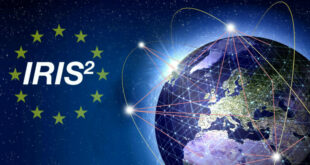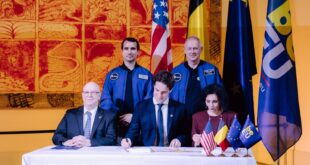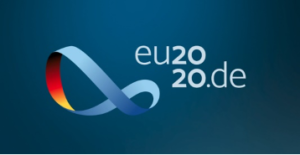 With the end of the year, Germany passed on the EU Council Presidency. After six months of tumultuous political developments and an intensification of the COVID-19 crisis, Germany was able to finalize the big dossiers relevant for the next years. SpaceWatch.Global Editor-in-Chief Markus Payer drew a resumé on the space portfolio with Prof. Dr. Kai-Uwe Schrogl, who is seconded from the European Space Agency (ESA) to the German Federal Ministry for Economic Affairs and Energy in Berlin to support the German Presidency of the Council of the European Union.
With the end of the year, Germany passed on the EU Council Presidency. After six months of tumultuous political developments and an intensification of the COVID-19 crisis, Germany was able to finalize the big dossiers relevant for the next years. SpaceWatch.Global Editor-in-Chief Markus Payer drew a resumé on the space portfolio with Prof. Dr. Kai-Uwe Schrogl, who is seconded from the European Space Agency (ESA) to the German Federal Ministry for Economic Affairs and Energy in Berlin to support the German Presidency of the Council of the European Union.
Markus Payer: Mr. Schrogl, in October you responded to our questions, providing a mid-term review of the German EU Council Presidency. Now after completion of the Presidency, were expectations fulfilled?
Kai-Uwe Schrogl: These were difficult months with a tense atmosphere, corresponding to what was at stake. Overall, the German Presidency managed to pass the EU Multiannual Financial Framework and NextGenerationEU with the Recovery and Resilience Facility, it established ambitious new climate goals and it helped to avoid a hard Brexit. Regarding space, we completed what we foresaw but it required a continuous plea for compromise. The results laid the basis for the first half of this decade. This is truly important for Europe’s ambitions in space.
How did COVID-19 impact your Presidency?
It impacted our Presidency a lot. This ranged from crisis management to providing new perspectives. ESA in particular was quick in adapting its programme management to ensure industry’s liquidity, for example through advance payments and milestone adaptations. This was swiftly followed by the EU and national bodies. Now we have to cope inter alia with consequences from fixed-price contracts and avoid that SMEs, start-ups and suppliers are not severely damaged during the next years. On the other hand, space applications, in particular provided by the EGNOS/Galileo and Copernicus, proved very useful in managing aspects of the pandemic.
You prepared the German Presidency initiative “Establishing key principles for the global space economy”. What was the intention?
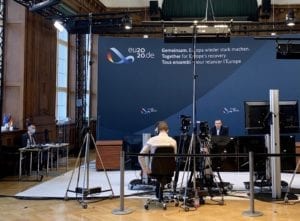
This initiative was embedded in the overall goals of the German Presidency to promote the establishment of rule-based international economic relations aiming at a level-playing field, including the newcomers. We translated it for the space economy. For this, we already held two workshops in the first half of 2020, gathering all Member States of the EU and ESA as well as the EC and the ESA-Executive. The formal negotiations then led to Orientations adopted at the EU-ESA Space Council on 20 November 2020. This is an important policy document, since it shows, for the first time on European level, the dimension and challenge for the European space sector in view of capturing a significant share of the global space economy of around 350 billion Euros today and of up to 1 trillion Euros after 2030.
What was the content of the initiative?
The initiative provided a new policy perspective, in that it subsumed various issue areas under the concept of the global space economy. These are trade regulations, financing mechanisms as the Unidroit Space Assets Protocol, space regulatory measures such as Space Traffic Management and cyber-security, together with standardisation. The Space Council’s “Orientations on the European contribution in establishing key principles for the global space economy”, adopted also separately by the EU Competitiveness Council and the ESA Council at Ministerial Level, elaborate on these elements. We now have an understanding of what should be done to be successful in the international marketplace; this also gives us visibility on the elements necessary for a COVID-19 recovery for the sector.
Space Traffic Management is obviously high on the agenda…
Yes, STM developed under our Presidency to the top regulatory issue as acknowledged on the European political level. I dedicated a lot of efforts to raise consciousness about this issue since 2006, when we published the first international study on STM in the International Academy of Astronautics. In 2018, we presented the follow-up study, which I coordinated again for IAA. STM was also put on the agenda of the UNCOPUOS Legal Subcommittee, when I was its Chairman in 2016. The US national elaboration of STM provides a clear challenge for Europe.
Is Europe prepared for international negotiations on STM?
Not yet. It was the purpose of the initiative to reach an understanding about STM’s relevance for Europe’s autonomy and sovereignty. This has been achieved. Now we have to build a position, in order not to be forced to simply adopt approaches and standards from the outside. For this purpose, a very concrete decision has been taken by the Space Council which is to hold a European STM conference. We will be able to set out our own course there and follow up in bilateral and multilateral discussions.
Your Presidency also had to deal with budgetary and regulatory acts. What was the outcome?
The overall budget was passed under the rather problematic conditions of two Member States blocking the process, which affected all dossiers including the space budget. But in the end, a substantive financial envelope of €14,88 billion until 2027 has been set aside for the space programme, broken down for Galileo and EGNOS: €9,02 billion; for Copernicus: €5,42 billion; and for SSA and GOVSATCOM: €442 million. It does not meet the expectations from the start of the negotiations in 2018 and it is rather low for Copernicus in particular, in view of supporting the Green Deal, but it was nevertheless hailed as a very solid basis for the EU’s space ambitions. Besides this and in the context of Commission President von der Leyen’s call for a European Defence Union, we have to see that the European Defence Fund will provide additional funding opportunities as will the elaboration of synergies and cross-fertilisation between the civil, defence and space industries, which was triggered by the Commission during our Presidency. Further money will flow from Horizon Europe and the Recovery and Resilience Facility.
And the results in the regulatory field?
Almost last minute, we achieved an agreement on the Space Programme Regulation during the trialogue with Parliament and Commission at a meeting ending only after midnight, the week before Christmas. This is a hugely important step to consolidate and further strengthen the management of the EU’s space efforts. This Regulation also establishes EUSPA, which has received a new young and competent leadership recently. It is still not an agency as we know it from ESA and national establishments, since the Commission maintains close control. But it has a sound basis now to do its job for the EU space programme as an operator and promoter. Sufficient funding for its new tasks should follow and duplication with ESA’s competences has to be avoided.
Sounds like tough negotiations…
The negotiations on the Regulation were arduous, I must say. The day before our Presidency started, we were confronted with a controversial draft text promoted by the Commission that complicated the transition for the preceding Presidency. Leakages to the press added to this unfriendly welcome when absurd headlines appeared like “German EU Council Presidency seeks to reduce autonomy of European Commission”. Discussions, as a kind of by-product of Brexit, on whether to keep out third parties – also traditional good space partners of the Union, namely Switzerland and Norway – in the name of autonomy, and to use security as pretext for industrial policy made the debates really tense. In the end, the pressure to reach a result before the new Multiannual Financial Framework started and the understanding that only compromises would work led to the successful finalization of the Regulation, after three years of negotiations.
Are the relations between ESA and the EU as strained after your Presidency as they have been before?
Our Presidency showed one thing, and it showed it very clearly: Member States want both, ESA and EU space activities. And they precisely know the benefits of the respective approaches and systems. This is why they do now allow for institutional power plays. They have great hope that with the change of leading personnel in all institutions involved, a new atmosphere will emerge. Everybody appreciates the strong personal engagement and dedication by Commissioner Breton, which is mirrored by the Member States Ministers’ interventions at the Space Council. Under such spirit, Europe’s standing and future in space is assured. We hope that the Financial Framework Partnership Agreement between EU and ESA will be agreed upon in this spirit in the near future, based on the successful conclusion of the EU space dossiers during our Presidency.
What were the most important coordination efforts that your Presidency had to accomplish?
We already coordinated early activities with the Croatian presidency and in the following months worked in the trio with Portugal and Slovenia. Throughout the preparation of the Space Council, the additional layer of coordinating the ESA-Chairship of France and Portugal was added. Constant dialogue was conducted with the Commission and the ESA Executive as well as with other EU institutions. Particularly for the initiative on the global space economy, we made numerous reality-checks with national and European industry associations. And additionally, I continuously communicated our initiative at meetings of think tanks, as ESPI, and NGOs. Lockdowns due to COVID-19 made our Presidency almost completely virtual and also prevented us from holding an international space law conference, foreseen for September in Berlin.
How was the work in the German Government and ministries structured?
I was glad to be in a position to advise the team at the German Ministry for Economic Affairs and Energy. At the front end, we had Christian Zankiewicz and Peter Stubbe as Chair and Vice Chair of the Space Working Party of the EU Council. The policy lead was held and masterminded in the Ministry by Department Head Max Kroymann, together with Tobias Rinke. Johannes Kerner guided our – unfortunately only virtual – hosting of the EU Space Week in early December. In particular in the final negotiations of the Space Programme Regulation, the overall political lines of the Presidency were felt, when it came for example to the implementation of the European Council line to limit the duration of the Space Programme, with a few necessary exceptions, according to the Multiannual Financial Framework.
You talked about compromises, which could lead to future problems. What is at the horizon, arising from your Presidency?
Take the Commissioner’s initiative for a new flagship, the Secure Space Connectivity System. It shows a strong and positive intention in view of Europe’s autonomy and sovereignty. We first have to tailor possibly contradictory objectives, such as governmental vs. commercial services vs. Public Private Partnerships in an already developed market. And we should not embrace the perspective of industrial monopolies. Public money is too valuable to be spent for that. This exemplifies a recurrent tension we saw during the Presidency, between autonomy and sovereignty on the one hand and a market-oriented, competition-based approach on the other. Commissioner Breton, who is well placed and, in a position, to raise additional means, faces such diverging but resolvable expectations. It is clear that the Commission as a supranational organisation strives for integration, that’s its overall political objective. ESA on the other hand means also integration albeit multilateralism and the establishment of an industrial policy mechanism which benefits all in an equitable manner. The Member States during the Space Council said: maintain both and seek best developments for the joint European space effort. This is not ambiguous but a valuable tool to avoid jumping on wrong paths and to lead our way in a balanced manner.
Where is the common ground for eventually diverging interests?
It already exists and just has to be developed. Take Copernicus, where it works marvellously. But also, the bigger strategic lines have already been set jointly. In 2016, Jaime Silva on the Commission side and myself on ESA’s side led the negotiations for the “Joint Statement on shared vision and goals for the future of Europe in space”, which was then signed by the Commissioner and the ESA Director General. Its three goals are to maximise the integration of space into European society and economy, to foster a globally competitive European space sector and to ensure European autonomy in accessing and using space in a safe and secure manner. When you look at our Presidency, all three goals received considerable support and saw good progress in becoming real.
After these detailed explanations and analyses, what is the resumé of the German EU Council Presidency?
European space will go out of COVID-19 in a strong position and with a good perspective. ESA can build on an unwavering support of its Member States and has chosen a promising new leader. The Commission has now an exceptional programmatic, budgetary and regulatory foundation, which will also provide European space policy on the international level with a new standing. Confidence of Member States in both institutions has to be translated by this triangle into coherent policies and concepts.
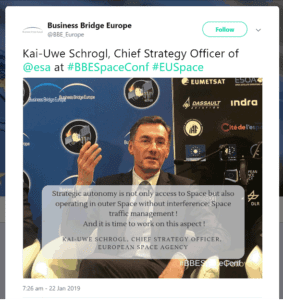
Prof. Dr. Kai-Uwe Schrogl is currently seconded from the European Space Agency ESA to the German Federal Ministry for Economic Affairs and Energy in Berlin to support the German Presidency of the Council of the European Union in the second half of 2020. Until 2019, he was the Chief Strategy Officer of ESA (Headquarters in Paris, France). From 2007 to 2011, he was the Director of the European Space Policy Institute (ESPI) in Vienna, Austria. Prior to this, he was the Head of the Corporate Development and External Relations Department in the German Aerospace Center (DLR) in Cologne, Germany. He worked previously with the German Ministry for Post and Telecommunications and the German Space Agency (DARA) in Bonn, Germany. Kai-Uwe Schrogl is the President of the International Institute of Space Law, the global non-governmental association of space lawyers from almost 50 countries. From 2014 to 2016 he served as the Chair of the UNCOPUOS Legal Subcommittee.



